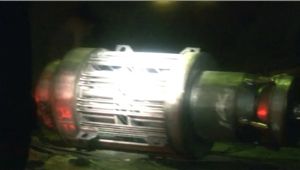Lion's Head beacon: Difference between revisions
No edit summary |
|||
| Line 9: | Line 9: | ||
Baltar is dispatched to the basestar to investigate. The beacon, as seen by Baltar, appears to have gelatinous material within slats in its interior ([[Torn]]). | Baltar is dispatched to the basestar to investigate. The beacon, as seen by Baltar, appears to have gelatinous material within slats in its interior ([[Torn]]). | ||
== Notes == | |||
*The story behind the Lion Nebula beacon and the virus may have been inspired by the lunar lander [[wikipedia:Surveyor 3|Surveyor 3]]. Before launching in 1967, its camera was accidentally contaminated by a common bacterium. When the camera was recovered by Apollo 12 astronauts, the microbes returned to life, having survived two and a half years of vacuum, radiation, and temperature extremes. | |||
== Related Imagery == | == Related Imagery == | ||
Revision as of 02:13, 12 November 2006

The Lion's Head beacon is found by the Cylons as they pursued a probable course to Earth from the Lion's Head Nebula, as researched by their captive, Gaius Baltar.
The beacon is apparently an human artifact left by the Thirteenth Tribe as they made their way from Kobol to Earth.
When the beacon is brought aboard the basestar, it soon infects the Cylons, including agents, Raiders, the Hybrid and the basestar itself. The Cylon Centurions, apparently controlled by the Hybrid, began shutting down as the infection progressed.
Baltar's basestar crew immediately quarantines their Resurrection Ship to prevent the reception of any transmitted consciousnesses from the dying basestar. They discovered quickly as the infection could spread into their community via their resurrection process.
Baltar is dispatched to the basestar to investigate. The beacon, as seen by Baltar, appears to have gelatinous material within slats in its interior (Torn).
Notes
- The story behind the Lion Nebula beacon and the virus may have been inspired by the lunar lander Surveyor 3. Before launching in 1967, its camera was accidentally contaminated by a common bacterium. When the camera was recovered by Apollo 12 astronauts, the microbes returned to life, having survived two and a half years of vacuum, radiation, and temperature extremes.
Related Imagery
-
Top back view
-
Top front view
-
View showing the gelatinous material